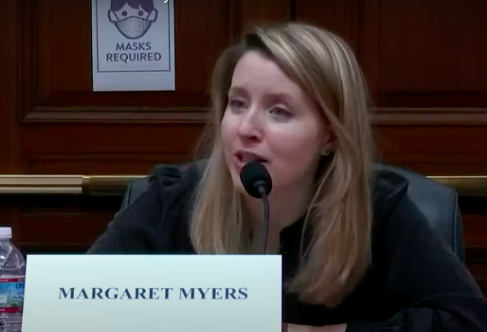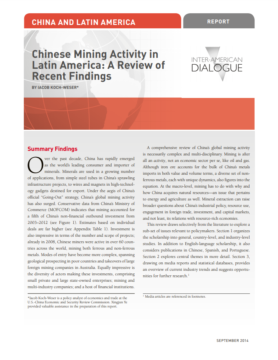The Politics Of Disaster Relief
After a 7.0 magnitude earthquake struck Haiti, the aftershock reached China in ways that few anticipated.The earthquake forced Chinese leaders to navigate the tricky politics of disaster relief.
Good morning. I would like to thank the Hearing Co-Chairs, Chairman Bartholomew and Commissioner Scissors, as well as the other Commission members and staff for the opportunity to testify today.
I see this moment—the Covid-19 pandemic and its aftermath—as a likely turning point in the China-Latin America relationship.
Despite some very public missteps by China in the region in recent months, concerns about the quality of some of China’s Covid-era deliveries, and even a rapid decline in Chinese sovereign lending to the region, it is quite probable that China’s targeted outreach over the past year—whether in response to Covid-19 specifically or through ongoing support for infrastructure and other projects—will do much to solidify and deepen China’s ties to the region.
It is quite probable that China’s targeted outreach over the past year—whether in response to Covid-19 specifically or through ongoing support for infrastructure and other projects—will do much to solidify and deepen China’s ties to the region.
It is also probable that Chinese companies will be comparatively well-positioned to invest in Latin America and the Caribbean in the coming months and years—certainly by acquiring assets in sectors, such as mining, oil and gas, energy infrastructure, that have been of interest to China for two decades now, but also in those areas where China is rapidly expanding its footprint, such as in the delivery of technological solutions at the national, provincial, and municipal levels.
And then there are the extensive and often-productive local—municipal and provincial-level—ties that Chinese governmental, quasi-governmental, commercial and other actors have been building for years in some cases, and which I think could be increasingly productive post-Covid-19.
In just the past few weeks alone we’ve seen a slew of new projects announced in Argentina, in particular, but also in other parts of the region. This includes China Machinery Engineering Corporation’s investment in a train car production facility in Santa Fe, Argentina; the approval of Phases 4 and 5 of Argentina’s Cauchari Solar project, and talk of a China-financed gas pipeline running from the Vaca Muerta shale field in Argentina, to Brazil.
Discussion of a possible trade deal with Uruguay and Mercosur has also re-emerged. An agreement for enhanced cooperation with China was also recently approved by El Salvador’s government. Other plans for commercial cooperation have also surfaced in recent weeks.
Chinese engagement will in some cases be quite supportive of the region’s recovery—this is a moment when Latin America and the Caribbean will need assistance, and infusions of capital, more than ever—and from a wide range of sources.
But there is also much at stake as China engages even more extensively with the region—and not just as concerns US interests. As we know, China’s track record is mixed in Latin America and the Caribbean. There is considerable variation in Chinese companies’ commitment to quality and sustainability when both selecting and developing projects. We also see varying commitment to consultation with local communities and other stakeholders, and to avoiding corrupt activities.
China’s activity is also known to undermine critical democratic institutions, even providing some governments with tools to limit freedom of expression in the name of stability. This is of very grave concern at a moment when the region’s democratic fundamentals are under siege from within, in many cases.
US engagement will be exceedingly important in the coming years, as the region grapples with wide-ranging economic challenges. US engagement is also important as the region possibly embraces China with greater enthusiasm. But in crafting a US approach, it will also be critical to bear in mind certain lessons learned from our previous efforts.
First of all, we should not assume that US concerns about Chinese influence, whether economic or otherwise, are necessarily held by Latin American and Caribbean audiences, including in those countries with very strong ties to the US. Concerns about Huawei and the possibility of Chinese surveillance are not shared by most in Latin America and the Caribbean, for instance.
Second—and this is a related point—we should recognize that broad US condemnation of Chinese economic and other practices in Latin America has not been an effective communication strategy.
US cooperation and public messaging vis-a-vis China should instead focus on those areas where US and Latin American interests frequently intersect, and where cooperative action can improve conditions on the ground. China’s monopolistic activity in sectors with security implications comes to mind, for example. It’s an issue that struck a chord in Chile in recent weeks. Or there is corruption, which is of much concern among audiences across the region, and is a regional problem from which China has benefitted on many occasions. There is also the issue of ecological degradation, whether as a result of illicit Chinese activity or China’s demand for certain primary commodities. This issue (corruption, too, of course) is of greater concern to some governments in the region than others but is one of paramount and, certainly, existential importance to segments of the population. It is also one where US-Latin America cooperation can do much to improve outcomes.
And finally, many Latin American and Caribbean nations indeed share certain democratic and other values with the US. But when considering whether to promote Chinese trade and investment or heed US warnings about Chinese influence, the region’s decisions will increasingly be based on economic interests rather than values-based ones.
When considering whether to promote Chinese trade and investment or heed US warnings about Chinese influence, the region’s decisions will increasingly be based on economic interests rather than values-based ones.
The US cannot rely on shared values to sustain key partnerships—or even just on security cooperation. US interests in the region, including as concerns competition with China, are best served by strengthening and reinforcing US economic ties to the region.
And so I would argue that in addition to doing things like donating more vaccines to Latin America and the Caribbean, working in-country to strengthen democratic institutions and accountability mechanisms, highlighting those instances of disconnect between Chinese policy and action, investing in American innovation, and importantly, making sure or own house is in order, as the pandemic prompts comparisons between US and Chinese models of governance, it will also be absolutely critical that the US plays a central role in ensuring the region’s sustainable economic recovery from the Covid-19 pandemic.
This is crucial not only for the region’s economic, social, and political stability but also in pursuit of hemispheric security and democracy. We can compete more effectively by reinforcing trade ties, for example, investing in sectors that will boost trade connectivity, and also by mobilizing capital and through targeted financial assistance, creating opportunities for private sector engagement, and in support of the SDGs, very importantly.
A robust US response—and really a new vision for hemispheric cooperation—would also underscore US commitment to Latin America’s stability and well-being at a moment when China is sometimes viewed in Latin America as quite supportive of the region’s development-related interests.
After a 7.0 magnitude earthquake struck Haiti, the aftershock reached China in ways that few anticipated.The earthquake forced Chinese leaders to navigate the tricky politics of disaster relief.
Despite reports in recent months that Mexican manufacturing is experiencing a resurgence, Mexico’s industrial sector faces tremendous challenges.
China has rapidly emerged as the world’s leading consumer and importer of minerals.
 US-China Economic and Security Review Commission
US-China Economic and Security Review Commission
